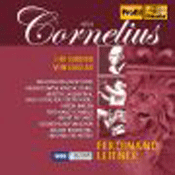26 Apr 2009
Barbers in Baghdad and Seville
Razor-wielding rascals involve themselves in romantic complications in the two sets considered here, with a fine performance of a rarity and an even finer performance of a classic.

Razor-wielding rascals involve themselves in romantic complications in the two sets considered here, with a fine performance of a rarity and an even finer performance of a classic.
From the archives of the Cologne Radio — aka, Westdeutscher Rundfunk Köln — Profil has rescued a 1974 performance of Peter Cornelius’s Der Barbier von Bagdad. A protégé of Franz Liszt, Cornelius both benefited and suffered from the great man’s influence. Liszt promoted Cornelius’s work and conducted the premiere of his comic opera in 1858. However, by that point Liszt had already made a fair number of enemies, and they came to hiss down both the conductor and the opera of Cornelius. Only long after Cornelius’s death did his opera find some audiences, although it has never really threatened to enter the standard repertory.
 Lothar Brandt, the author of the German program note which J & M Berridge translated into English, takes the interesting tack of arguing that the very old-fashionedness of both Cornelius’s music and the libretto makes Der Barbier von Bagdad “cool.” Cornelius barely makes any effort to introduce any “Oriental” aspects to his pleasant, very conservative score, and the story is a harmless bauble, adapted from The Arabian Nights. Apparently Brandt sees the opera as so “uncool,” it is “cool.” Maybe. It would take a ripping tune or two to make the score more memorable. With no texts provided, judging the success of the work dramatically will elude the non-German speaker. However, most of the scenes seem to have relatively little character interaction, and the comic energy that percolates throughout Rossini’s masterpiece on the “barber” theme raises not a crackle here.
Lothar Brandt, the author of the German program note which J & M Berridge translated into English, takes the interesting tack of arguing that the very old-fashionedness of both Cornelius’s music and the libretto makes Der Barbier von Bagdad “cool.” Cornelius barely makes any effort to introduce any “Oriental” aspects to his pleasant, very conservative score, and the story is a harmless bauble, adapted from The Arabian Nights. Apparently Brandt sees the opera as so “uncool,” it is “cool.” Maybe. It would take a ripping tune or two to make the score more memorable. With no texts provided, judging the success of the work dramatically will elude the non-German speaker. However, most of the scenes seem to have relatively little character interaction, and the comic energy that percolates throughout Rossini’s masterpiece on the “barber” theme raises not a crackle here.
Ferdinand Leitner, seemingly motivated by a sincere love for the music, gives it first-class treatment, along with an excellent cast. Hans Sotin brings comic flair to the title role, and as the requisite young lovers, Helen Donath and Horst R. Laubenthal make a sweet pair. The sound is clean. Profil needs to stop providing track listings only on the back of the jewel cases, a user-unfriendly arrangement.
EMI Classics, meanwhile, reissues in its Great Recordings of the Century series the Callas/Gobbi Il barbiere di Siviglia, conducted by Alceo Galliera. The opera has a rich recording history, but this set is special, mostly thanks to its two stars. Not everyone appreciates Gobbi’s vocal gifts, which can tend to the dry side, but his ability to characterize as he sings is unparalleled. This Figaro works his wiles with cunning charm.
And not everyone always appreciates Maria Callas, either, but here she is everything her besotted admirers claim her to be. The voice is steady, alluring, distinctive. She has full technical control of every aspect of the score. Even her somewhat calculated effects, like the ostentatiously delayed delivery of that “ma” in “Una voce poco fa,” can be tied to the character of Rosina, a young lady far smarter and in control that is sometimes portrayed. Callas easily posses center stage when her solo turns come, and just as importantly, she easily rejoins the ensemble as necessary too. For her alone, the recording earns its “GROTC” label.
Luigi Alva sings sweetly enough, although the arias don’t quite pull together. The tone eerily brings to mind at times today’s leading exponent of Almaviva, Juan Diego Florez.
Conductor Galliera supports the singers to the point of indulgence. The end of act one brings the best of his efforts, with a very theatrical, vivacious reading. Some other spots feel more studio-bound. The remastering is excellent, and EMI provides a very nice booklet, slim and yet with a bilingual text.
So the Cornelius makes for an amiable byway, and the Callas/Gobbi makes a well-trod path fresh again. Go which way you please, reader.
Chris Mullins